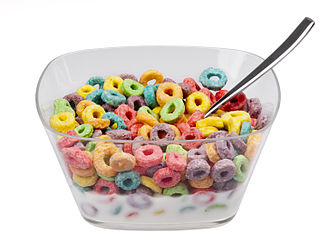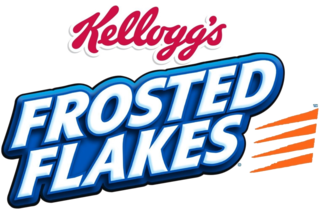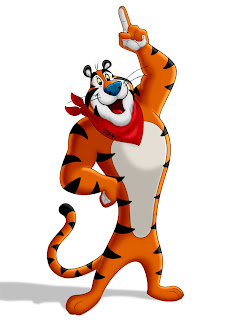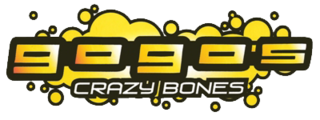
Breakfast cereal is a category of food, including food products, made from processed cereal grains that are eaten as part of breakfast, or as a snack food, primarily in Western societies.

Corn flakes, or cornflakes, are a breakfast cereal made from toasting flakes of corn (maize). Originally invented as a breakfast food to counter indigestion, it has become a popular food item in the American diet and in the United Kingdom where over 6 million households consume them.

Froot Loops is a sweetened, fruit-flavored breakfast cereal made by WK Kellogg Co for the United States, Canadian, and Caribbean markets and Kellanova for the rest of the world. The brand was solely owned by the original Kellogg Company before it spun off its North American cereal division as WK Kellogg Co in late 2023. The fruit-flavored cereal pieces are ring-shaped, with a variety of bright colors.

Frosted Flakes or Frosties is a breakfast cereal, produced by WK Kellogg Co for the United States, Canada, and Caribbean markets and by Kellanova for the rest of the world, and consisting of sugar-coated corn flakes. It was introduced in the United States, in 1952, as "Sugar Frosted Flakes". The word "sugar" was dropped from the name in 1983.

Toucan Sam is the cartoon toucan mascot for Froot Loops breakfast cereal. The character has been featured in advertising since 1963. He exhibits the ability to smell Froot Loops from great distances and invariably locates a concealed bowl of the cereal while intoning, "Follow your nose! It always knows!", sometimes followed by "The flavour of fruit! Wherever it grows!" Another version of this phrase in a string of commercials in the late 2000s presents the character at the end of the commercials saying "Just follow your nose!", followed by his nephews retorting, "For the fruity taste that shows!"

Corn Pops is a puffed grain breakfast cereal made by WK Kellogg Co, described by the company as "crunchy sweetened popped-up corn cereal." The cereal was introduced in 1950 as "Corn Pops". In 1951, the name was changed to "Sugar Corn Pops" and later to "Sugar Pops". It was the sponsor for The Adventures of Wild Bill Hickok radio and television show. The name was changed back to 'Sugar Corn Pops' in 1978, and finally returned to 'Corn Pops' in 1984, a time when many cereals dropped the word "sugar" from their titles for marketing reasons. In January 2006, the name of the cereal was changed to 'Pops', but after a few months of poor reception was changed back to Corn Pops.

Will Keith Kellogg was an American industrialist in food manufacturing, who founded the Kellogg Company, which produces a wide variety of popular breakfast cereals. He was a member of the Seventh-day Adventist Church and practiced vegetarianism as a dietary principle taught by his church. He also founded the Kellogg Arabian Ranch, which breeds Arabian horses. Kellogg was a philanthropist and started the Kellogg Foundation in 1934 with a $66-million donation.

Rice Krispies is a breakfast cereal produced by WK Kellogg Co for the United States, Canadian, and Caribbean markets and by Kellanova for the rest of the world. Rice Krispies are made of crisped rice. When milk is added to the cereal the rice tends to collapse, creating the characteristic "snap, crackle and pop" sounds.

A product recall is a request from a manufacturer to return a product after the discovery of safety issues or product defects that might endanger the consumer or put the maker or seller at risk of legal action. Product recalls are one of a number of corrective actions that can be taken for products that are deemed to be unsafe.

Tony the Tiger is the advertising cartoon anthropomorphic tiger mascot for Frosted Flakes breakfast cereal, appearing on its packaging and advertising. After the original Kellogg Company spun off its North American cereal business in late 2023, the mascot is owned by WK Kellogg Co in the U.S., Canada, and Caribbean markets and by Kellanova in the rest of the world. Tony has also been the mascot for related cereals such as Tony's Cinnamon Krunchers and Tiger Power. Since Tony's debut in 1952, the character has spanned several generations and has become a breakfast cereal icon.

Chex is an American brand of breakfast cereal currently manufactured by General Mills. It was originally known as Shredded Ralston, first produced in 1936 and owned by Ralston Purina of St. Louis, Missouri, then later renamed Chex in 1950. The Chex brand went with corporate spinoff Ralcorp in 1994 and was then sold to General Mills in 1997. Rival cereal company Kellogg's has the rights to the Chex brand in South Korea and Singapore.

Shredded wheat is a breakfast cereal made from whole wheat formed into pillow-shaped biscuits. It is commonly available in three sizes: original, bite-sized and miniature. Both smaller sizes are available in a frosted variety, which has one side coated with sugar and usually gelatin. Some manufacturers have produced "filled" versions of the bite-size cereal containing a raisin at the center, or apricot, blueberry, raspberry, cherry, cranberry or golden syrup filling.

Gogo's Crazy Bones are colorful plastic figurines that can be used to play many different games, similar to marbles and jacks. There were many series throughout their production. Each piece is a different character with a name and personality. They became a popular fad during the late 1990s. Crazy Bones were produced by PPI Worldwide and distributed by Spanish company Magic Box, Int. from 1996-2019.
A cereal box prize, also known as a cereal box toy in the UK and Ireland, is a form of advertising that involves using a promotional toy or small item that is offered as an incentive to buy a particular breakfast cereal. Prizes are found inside or sometimes on the cereal box. The term "cereal box prize" is sometimes used as a broader term to also include premiums that can be ordered through the mail from an advertising promotion printed on the outside of the cereal box.

The Snow Trac is a small personal Snowcat that is roughly the size of a modern compact car. Aktiv Snow Trac were manufactured in Sweden between 1957 and 1981, with additional vehicles manufactured in Scotland.
Prizes are promotional items—small toys, games, trading cards, collectables, and other small items of nominal value—found in packages of brand-name retail products that are included in the price of the product with the intent to boost sales, similar to toys in kid's meals. Collectable prizes produced in series are used extensively—as a loyalty marketing program—in food, drink, and other retail products to increase sales through repeat purchases from collectors. Prizes have been distributed through bread, candy, cereal, cheese, chips, crackers, laundry detergent, margarine, popcorn, and soft drinks. The types of prizes have included comics, fortunes, jokes, key rings, magic tricks, models, pin-back buttons, plastic mini-spoons, puzzles, riddles, stickers, temporary tattoos, tazos, trade cards, trading cards, and small toys. Prizes are sometimes referred to as "in-pack" premiums, although historically the word "premium" has been used to denote an item that is not packaged with the product and requires a proof of purchase and/or a small additional payment to cover shipping and/or handling charges.

A baking powder submarine is a plastic toy submarine that dives and surfaces with the addition of baking powder. Baking powder submarines are sometimes misidentified as "baking soda submarines"; however, baking soda alone dissolves but does not react when placed in water.

Shopkins are a range of tiny, collectable toys manufactured by Moose Toys. Based on grocery store items, each plastic Shopkin figure has a recognizable face and unique name. They also have special finishes like translucent, glitter, or squishy. The collectable toys also expanded into lines of clothing, trading cards, and other related merchandise.

Harry Hargreaves was an English cartoonist, best remembered for The Bird, which he produced for Punch, and for Hayseeds in the London Evening News.
























